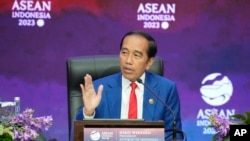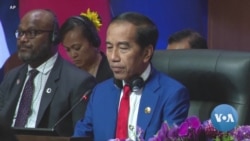Amid sharpened geopolitical rivalry between the United States, China and Russia, Indonesian President Joko Widodo delivered a forceful call for leaders to ease tensions and avoid conflict in the region.
Speaking Thursday in Jakarta at the opening of the East Asia Summit (EAS), which brings together the Association of Southeast Asian Nations (ASEAN) and its partners – the United States, China, Russia, Australia, India, Japan, New Zealand, and South Korea, Widodo underscored the need for stability for the region to continue its decades-long peace and prosperity.
“Everyone in this room has the same responsibility to not create new conflict, to not create new tension, to not create new wars,” he said, speaking in Indonesian. “At the same time, we have the responsibility to lower heated tensions, to thaw frozen state of affairs, to create room for dialogue, to bridge existing differences.”
However, leaders of the three major powers – U.S. President Joe Biden, Chinese President Xi Jinping and Russian President Vladimir Putin – chose to skip the summit, sending instead their respective representatives, Vice President Kamala Harris, Premier Li Qiang and Foreign Minister Sergey Lavrov.
As the outgoing chair of ASEAN, earlier this week Widodo declared that the bloc “has agreed not to become a proxy for any power. He reiterated that Southeast Asia will not become the front lines of a new Cold War – a pledge he made when he took the helm of ASEAN from Cambodia in 2022.
Indonesia’s approach on great power politics has been consistent, said Aaron Connelly, research fellow at the International Institute for Strategic Studies.
“They view great power rivalry as the primary threat to their interests in the region,” he told VOA. “And they see rivalry itself as the threat, not one country creating the rivalry.”
Leaders push back
Widodo’s words were echoed by other Southeast Asian leaders who pushed back against the threat of division in the region.
“The international environment is fraught with geopolitical tensions and economic uncertainty,” said Singapore Prime Minister Lee Hsien Loong. He called on Washington and Beijing to “show leadership” to address global issues.
The pushback is warranted, said Evi Fitriani, professor of international relations at Universitas Indonesia. “It’s time that we tell those superpowers that what they’re doing in the region is too much already,” she told VOA.
EAS emerged in 2005 as a regional dialogue forum of ASEAN and six partners, with the aim of promoting peace, stability and economic prosperity. The U.S. and Russia joined in 2011.
East Timor was invited as a summit observer this year, as well as Bangladesh and the Cook Islands, as chair of the Indian Ocean Rim Association and Pacific Islands Forum, respectively.
Summit leaders focused on ASEAN’s inability to urge the junta in Myanmar to abide by its peace plan, China’s increasing assertiveness over disputed areas in the South China Sea, the global impact of the war on Ukraine and threat of North Korea’s nuclear program.
Harris “strongly condemned” the war on Ukraine that has “exacerbated food insecurity.” She condemned North Korea’s ballistic missile and nuclear programs, and raised concerns on China’s “grave human rights abuse,” according to the White House.
Echoing ASEAN’s strong language on Myanmar, she condemned the military regime’s “brutal campaign of violence” and urged further action to increase pressure to implement ASEAN’s peace plan.
EAS ended Harris’ two-night stay in Jakarta and the vice president left to return home to Washington.
Wednesday night she met with President Ferdinand Marcos Jr. of the Philippines and Prime Minister Fumio Kishida of Japan, where she underscored “U.S. opposition to unilateral changes to the status quo in the South China Sea and East China Sea.”








